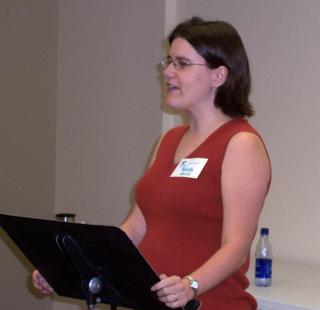Tuesday, October 04, 2005
Welcoming the Stranger

Another view of immigration.
Melinda Lewis of El Centro visited St. Paul's Adult Sunday School to speak about "welcoming the stranger." She began with appropriate Biblical quotations showing the Christian tradition of hospitality to immigrants. For example: "The immigrant that dwelleth with you shall be unto you as one born among you, and thou shalt love him as thyself; for ye were immigrants in the land of Egypt. I am the Lord your God." (Leviticus 19:34.) She then asked in effect, what does "welcoming the stranger" look like in the 21st century United States?
This report reflects my views only, not those of St. Paul's or the United Methodist Church.
One thing welcoming the stranger must mean is more resources to carry out established immigration policy. Immigrants wait years, not only to meet legally mandated waiting periods, but also simply because of backlogs of unprocessed cases at government agencies. An immigrant may have a legally imposed five-year waiting period from the time they are granted resident status until they can apply for citizenship. They must then wait three or four more years before they can complete the process simply because there are not enough resources invested by the government in the agencies doing the work. Folding the INS into Department of Homeland Security seems to have exacerbated the problem. For example, the "US Citizenship and Immigration Services" publishes a toll free phone number (1-800-375-5283) but no one answers it. DHS is so big, the smaller agency's needs are easy to overlook.
Another important element is policy that helps preserve families. A tragic unintended consequence of the way our policies work in practice is to separate mothers and daughters, fathers and sons, husbands and wives; often for eight years or longer. Melinda told the story of a Polish immigrant she met recently. The woman described her four-year old daughter in loving detail, how the child looks, her personality and so forth: the mother knows these details only by correspondence with relatives. She last saw the child at age eight months. Immigration lawyers and experts tell her the child will be about eleven years old before they are reunited.
This situation is far too common.
I feel the irony of our politicians loudly proclaiming the sacredness of "family values" while quietly pursuing policies so utterly destructive to families.
Another tragedy that cries out for intervention is death at the border. So far this year, an estimated 500 people died trying to cross the border. Melinda proposes two ideas to alleviate the problem. First, rationalize and ease legal immigration. Second, make use of advanced technology to monitor the border. Most of the deaths were due to the heat in the Arizona desert. She did not elaborate, but I would imagine this means we would catch more illegal aliens sooner as they tried to cross into the US. Sort of get them before the heat kills them.
I have read about proposals for an "electronic fence" to be built across the US-Mexico border. I'm not sure of the status of this technology. What I don't understand is why our politicians aren't pushing this.
Melinda addressed the issue of illegal alien college students in response to a question. She said she is reluctant to advise anyone contrary to what law professor Kris Kobach said last week. However, she believes the age of majority under immigration law is 21, not 18 as stated by Mr. Kobach.
My own skim over the rules http://uscis.gov/graphics/lawsregs/handbook/CSPA092002_pub.pdf shows the situation is incredibly complicated. In some cases, an individual will be treated as a "child" well beyond the age of 21. This is because an application process could be started for a 20 year-old but not be finished for four or more years.
Melinda said the status of an immigrant is not simple, straightforward and fixed. Status changes, sometimes from day-to-day. For example, one visa classification recently lost status because Congress forgot to keep a promise to renew. Her office was inundated by panicked callers, aware that they had suddenly become illegal. Congress missed renewing the law giving them their status by a day, so Congress made the status retroactive.
In response to another question, Melinda said that contrary to the myths about illegal aliens, they do not get their pay in cash. In fact, only about eight percent receive wages in cash. However, the stereotype that they tend to pay for everything in cash is true. This both helps them avoid debt but also keeps them from establishing credit.
Missing from both Mr. Kobach's presentation and Ms. Lewis was a realistic discussion of the overall economics of illegal immigration. I'm not referring to the price of smuggling people over the border, neither am I talking about the price of lettuce.
Mr. Kobach says there are 10 million people in the US illegally. Ms. Lewis estimates 8 to 12 million. My feeling is this situation economically benefits the United States. An illegal labor pool can be easily exploited by unscrupulous employers; after all, who will the employees complain to, the INS? Not only does this keep the price of immigrant labor low, it also tends to depress the price of legal labor. Just how much would lawn mowing or construction cost without illegal aliens doing part of the labor?
I can think of no other plausible explanation of why a nation that calls itself "the greatest" would tolerate such a large invasion of illegal foreign nationals.
Consider: An income tax refund is issued within weeks, not years. Social Security retirement claims are often processed within two weeks. Even a passport takes around three months. These are all important to us as a nation. The fact that we tolerate processing wait times of years and years for the legal workings of immigration shows that we, as a nation, simply do not care to face the issue squarely.
I would also like to ask: Why does the fact that one's great-grandparents immigrated to the United States make one morally superior to a new immigrant? This last week, I was watching wacthing Fox television news and seeing the talking heads in a frenzy over the border with Mexico. These men, in their righteous indignation, in their eagerness to cast stones, do not act in the public interest. They speak out of pride and arrogance, to further their own ends. I fail to see how whippping up public furor over this issue contributes in any way to the discussion. I fail to see how they deepen understanding. I fail to see how they build any bridges. I fail to see how they strengthen the community.
We must remember, in the United States, we are all from immigrant families.
